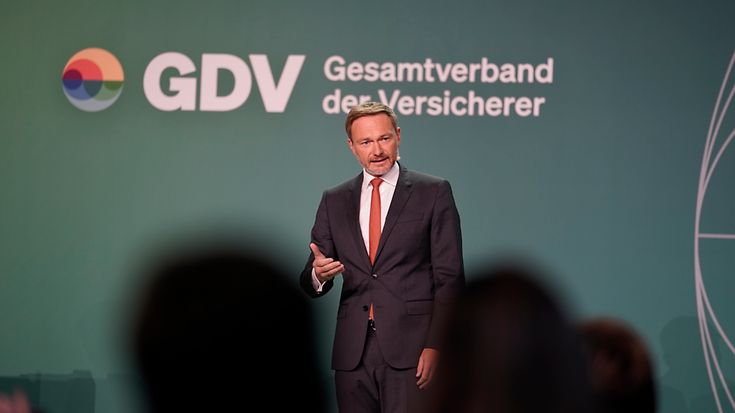The federal government wants to drum up money from insurers
Insurance Day 2022: Speaking at the GDV's Insurance Day, Federal Minister of Finance Christian Lindner took the opportunity to make his case for more private investment to finance the transformation, among others. He promised to help make the industry more competitive. As for the reform of private pension provision insurers are hoping for, however, he failed to say anything of substance.

Federal Minister of Finance Christian Lindner (FDP) asked the insurers to step up their investments in Germany. “A bit more private capital in Germany must surely be possible,” Lindner said at the Insurance Day organised by the German Insurance Association (GDV) in Berlin.
He also expressed the wish that not everything would be invested in “stone and bonds” but in “higher-performing” asset classes, as well. By that he didn't mean just stocks but also other forms of equity investments that could help transform the economy. Specifically, the FDP chairman promoted the federal government's Future Fund aimed at improving the financing conditions of German start-ups. “Be a part of that!”, Lindner asked the roughly 150 insurance executives in attendance.
Regulatory goals of equal importance: financial stability, consumer protection and competitiveness
In his capacity as Minister of Finance he wanted to help strengthen the insurance industry's competitiveness, Lindner said. “Financial stability, consumer protection and competitiveness are three regulatory goals of equal importance”, the minister emphasised. While there was always some pressure to justify the profitability of private enterprise in Germany, it was in the country's best interest that insurance companies be profitable, too. “Germany's real asset as a financial centre is the insurance industry”, Lindner said, hinting at the leading role of German primary and reinsurers in the world.
Regarding the federal government's plans to reform private pension provision – one of the insurance sector's core business segments – he remained vague, however: While he did mention the need for a reform of Germany's state-subsidized private pension plans called Riester and Rürup, for example as far as premium guarantees and costs are concerned, Lindner failed to elaborate on what this reform might look like. “The political discussion on this is still in a very early phase”, Lindner said. The only measure he did announce, was mandatory old-age provision for the self-employed.
Versicherungstag 2022
Impressions from the Insurance Day on September 22 2022 in Berlin. The list of speakers included Federal Minister of Finance Christian Lindner (FDP); Executive Director of the Federation of German Consumer Organisations (vzbv) Ramona Pop; CDU Secretary General Mario Czaja as well as the newly appointed GDV President Norbert Rollinger.
GDV President Rollinger underlined the industry's spirit of cooperation
Norbert Rollinger, the newly appointed President of the German Insurance Association (GDV), stressed the industry's willingness to cooperate: “We are reaching out to government and consumer protection advocates regarding funded pension provision”, said Rollinger, who had been elected by the GDV Board to follow Wolfgang Weiler as President of the GDV the night before. Naturally, in times of crisis, old-age provision tended to take a back seat to short-term imperatives, Rollinger said. “I am convinced, however, that given our current crises and demographic change, the three-pillar pension system will gain in importance again.” Rollinger went on to suggest that in order to avoid being replaced by simpler fund solution, insurers needed to challenge their way of doing things and emphasise their USP more strongly.
Ramona Pop, Executive Director of the Federation of German Consumer Organisations (vzbv), is also hoping a reform of private pension provision will be agreed upon before the current legislative period is over. “While we do need to deal with a crisis right now, we must not neglect all the other challenges, such as demographic change for instance”, Pop said. Time was running out as baby boomers were nearing retirement. The Federation of German Consumer Organisations (vzbv) suggests following Sweden's model of a public pension fund and doing away with the Riester private pension plans. “After numerous reform attempts we need a fresh start here.” Pop's suggestion is to merge all the current Riester plans into the new public fund.
CDU Secretary General Czaja remained vague on Riester
Mario Czaja, Secretary General of the CDU, was rather tight-lipped about his party's ideas on what to do with state-subsidised pension provision: “We want to move on from Riester”, is all he had to say on the subject. At the same time, he seemed to like the idea of a so-called Deutschlandfonds, first floated by Junge Union, the CDU's youth branch. With that model every newborn would get EUR 20.000 from the government and that money would need to be invested in a diversified portfolio of capital market assets. “This would provide a level playing field for everyone”, Czaja explained. He also talked about another idea that was currently being discussed in his party: possible tax breaks for capital gains from long-term investments intended for old-age provision for example. “We need to consider tax exemptions and allowances,” he said before conceding that the party hadn't agreed on anything, yet.